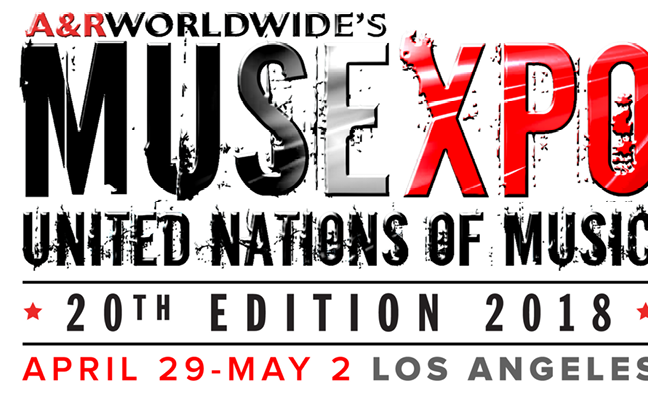An ensemble cast of heavyweight execs debated the music industry’s next moves at a lively second day at the MUSEXPO conference in Los Angeles.
The event always attracts an A-list cast and this year was no exception, as Monday kicked off bright and early with the ‘State Of The Sonic Union’ Global Keynote panel – and a debate about the impact of streaming.
With Amazon Music’s global head of programming & content strategy Alex Luke on the panel – a rare public appearance from a senior Amazon exec – Alexa was top of the agenda, with even Radio 1 controller Ben Cooper admitting that ‘voice is the future’.
“In my house I have to separate my children as to who will shout the loudest at Alexa,” said Cooper, before insisting that radio’s curation and emphasis on live moments meant it would see off streaming, just as it had the challenge of TV, the Walkman and the iPod.
Nonetheless, Luke was bullish on the future for his streaming service, saying Amazon Music’s subscriber base had doubled in the last six months, driven primarily by voice. “Voice will change the music business in a very positive way,” he said.
It’s that kind of growth that’s returned the biz to the good times and Atlantic Records US chairman/CEO Craig Kallman was confident it would continue.
“You can never say anything is permanent, but it’s certainly a very optimistic time,” he said. “We’re experiencing growth and we’re able to hire more people and invest more in our artists. We’ve very bullish about the prospects in the near term and aggressively trying to build and grow each genre.”
The panel – which also featured Ford’s Scott Burnell, Times Music’s Mandar Thakur and Tracey Trench Productions’ Tracey Trench and was hosted by Music Week editor Mark Sutherland – also identified in-car streaming and the globalisation of the music business as key areas for the next few years.
BMG president of US repertoire and marketing Zach Katz was also in bullish mood during his keynote, hosted by Music Week’s Emmanuel Legrand.
“The biggest difference between BMG and any other company out there is, we put artists first,” he said, as he laid out BMG’s position as a new model company across records and publishing.
“BMG has never been and never will be a market share company,” he said. “Our focus isn’t bragging rights. We have two Top 5 US albums this week. Does that feel good? Absolutely. Is it our North Star? Absolutely not.”
Those comments might have raised an eyebrow or two at other labels, and Craig David’s manager Colin Lester was also out to cause a stir on the management panel.
“Radio is still the No.1 discovery [platform] for music” and “I’d rather have 5,000 credit card [details] than 100,000 people on a mailing list” were just a couple of the soundbites he threw out, although he lacked a foil – in the style of Sammy Andrews during their classic MUSEXPO Europe debate a couple of years ago – amongst the US managers on the panel (although Andrews did get involved on Twitter from the other side of the Atlantic).
And Friends At Work’s head of digital marketing & strategy Jeremy Gruber did join Lester in showing a more relaxed attitude to YouTube than many ‘value gap’-obsessed execs, Gruber declaring the platform had more value as a marketing tool than as a revenue stream for many artists.
“It’d be great to get paid properly, but it wouldn’t stop us putting stuff up there,” agreed Lester.
BMG has never been and never will be a market share company. Our focus isn’t bragging rights. We have two Top 5 US albums this week. Does that feel good? Absolutely. Is it our North Star? Absolutely not
Zach Katz, BMG
Finally, music supervision queen Alexandra Patsavas of Chop Shop Music closed the day with an entertaining keynote interview with Sutherland, covering her pioneering work on such shows as The OC, Gossip Girl, Grey’s Anatomy, Twilight and The Hunger Games.
Patsavas said The OC in particular provided her with free rein as music was so important to the characters. Indie rockers Death Cab For Cutie consequently gained crucial mainstream exposure.
"Josh Schwartz, the show runner, wanted music to be a character, and we happen to love the same kind of music," she said. “It was a mixed bag for Death Cab; it did so much [for them] but I’m sure it was hard to be ‘The OC’s Death Cab’ at times.”
Those days seem a long time ago now, but Patsavas also hopefully declared: “Indie rock is coming back.”
Fewer artists or songs obviously ‘break’ through syncs nowadays, but Patsavas said the right sync could still make careers.
“It is different,” she said. “But given the right show, the right sync and the right moment, it still has an impact.”
MUSEXPO continues tomorrow. Stay tuned to musicweek.com and our socials for further updates. To catch up with the Day 1 action, click here and to check out our pick of this year’s panels, click here.
Reporting: Emmanuel Legrand & Mark Sutherland










